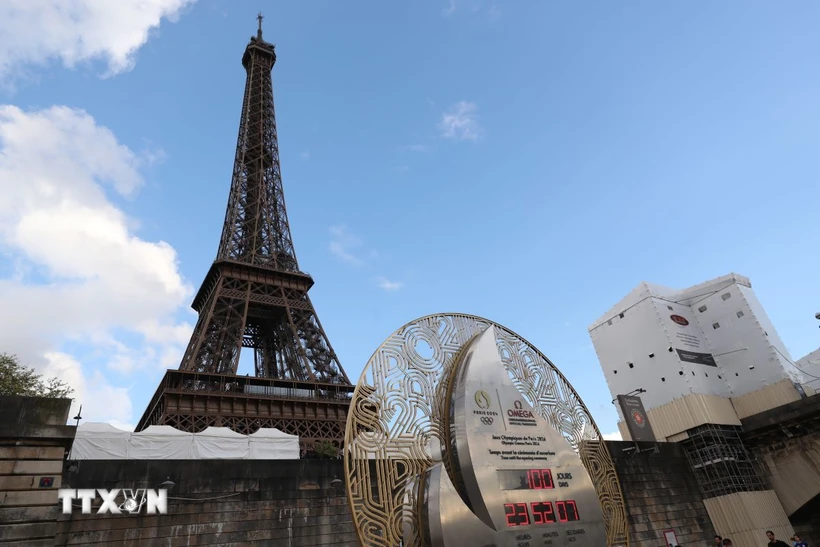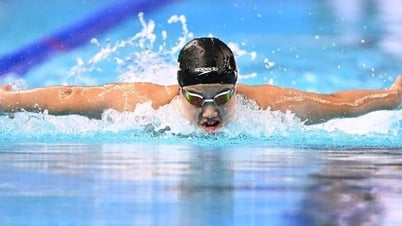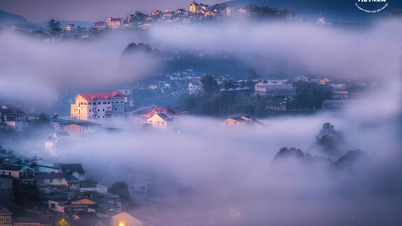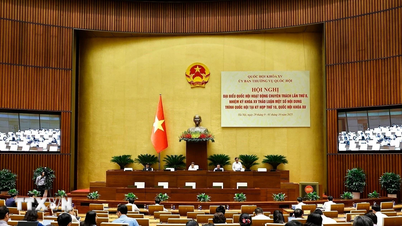In the report titled “Global Wealth and Lifestyle Report”, Paris ranked 8th among the cities with the most “sky-high” spending levels in the world for the super-rich class in 2024.

Among the European Union (EU) member states, France is among the countries with extremely high living costs. In particular, when compared to other European countries such as Italy, Portugal or Spain, the French capital Paris is ranked as one of the most expensive cities in the world.
In the report titled “Global Wealth and Lifestyle Report” published by the bank specializing in serving the wealthy Julius Baer on June 26, Paris also ranked 8th among the cities with the most “sky-high” spending levels in the world for the super-rich class in 2024.
However, not everything in Paris is overly lavish and magnificent, and this year's Olympics also show a very different image of the French capital.
Compared to other sports events, the most recent being the 2022 Asian Games that VNA reporters attended last year in Hangzhou (China), the 2024 Paris Olympics are much "simpler".
For example, while at the 2022 Asian Games, the Organizing Committee arranged a system of short-distance buses to take reporters from the Main Press Center (MPC) to the competition venues, in France, the Paris 2024 Olympic Organizing Committee only issued reporters a card to use public transport such as buses, subways and trams.
Regarding the issue of drinking water at the Paris Olympics, the familiar image of Paris fans in particular and European fans in general when coming to Olympic venues is carrying a thermos or a water bottle.
Here, drinking water is provided free of charge at the fountains located in the stadium, similar to the free water fountains often seen at Noi Bai Airport. If you do not bring a water bottle, you can drink directly from the tap and even in the restrooms there is a red sign stating that the water from the tap is safe for drinking.
Not only fans, but also reporters who need to drink water can use the same free water dispenser as the fans. The filtered water provided to reporters at the Press Center at the competition venue is also taken directly from this water dispenser and poured into a glass bottle, creating a familiar feeling like drinking water at home.
And when we arrived at the rowing venue in Vaires-sur-Marne, a suburb of Paris, we saw a notice in the beverage service area for reporters asking them to write their name on the disposable paper cup so they could reuse it many times, instead of just drinking it once and then throwing it away.
To serve the 2024 Paris Olympics, the host country has built a new metro line to supplement Paris' already comprehensive public transport system.
But besides the new cool train lines with full air conditioning systems, there are still some old trains with worn seats and no cooling system, so every time the train slows down or stops to pick up passengers, the air in the cabin becomes extremely hot.
Normally, trains always have LED route displays and announcement speakers at each station so that passengers know where their destination is, but that only happens with new train lines.
With the old routes, there are no LED boards to announce the journey and no loudspeakers either. Passengers who want to get on or off have to open the doors themselves, not the automatic doors.
Therefore, when traveling by these old train routes, passengers must either be very familiar with them or very focused, otherwise they risk missing their trip or getting off at the wrong destination.
However, these things do not seem to affect the level of admiration that European people have for the 2024 Paris Olympics, because we still see large groups of people getting on and off each train station to head to the Olympic venues with excitement and comfort, just like the way people happily line up to wait for free drinks at the stadiums./.


![[Photo] General Secretary To Lam, Secretary of the Central Military Commission attends the 12th Party Congress of the Army](https://vphoto.vietnam.vn/thumb/1200x675/vietnam/resource/IMAGE/2025/9/30/9b63aaa37ddb472ead84e3870a8ae825)
![[Photo] Solemn opening of the 12th Military Party Congress for the 2025-2030 term](https://vphoto.vietnam.vn/thumb/1200x675/vietnam/resource/IMAGE/2025/9/30/2cd383b3130d41a1a4b5ace0d5eb989d)
![[Photo] The 1st Congress of Phu Tho Provincial Party Committee, term 2025-2030](https://vphoto.vietnam.vn/thumb/1200x675/vietnam/resource/IMAGE/2025/9/30/1507da06216649bba8a1ce6251816820)

![[Photo] President Luong Cuong receives President of the Cuban National Assembly Esteban Lazo Hernandez](https://vphoto.vietnam.vn/thumb/1200x675/vietnam/resource/IMAGE/2025/9/30/4d38932911c24f6ea1936252bd5427fa)
![[Photo] Panorama of the cable-stayed bridge, the final bottleneck of the Ben Luc-Long Thanh expressway](https://vphoto.vietnam.vn/thumb/1200x675/vietnam/resource/IMAGE/2025/9/30/391fdf21025541d6b2f092e49a17243f)






























































































Comment (0)